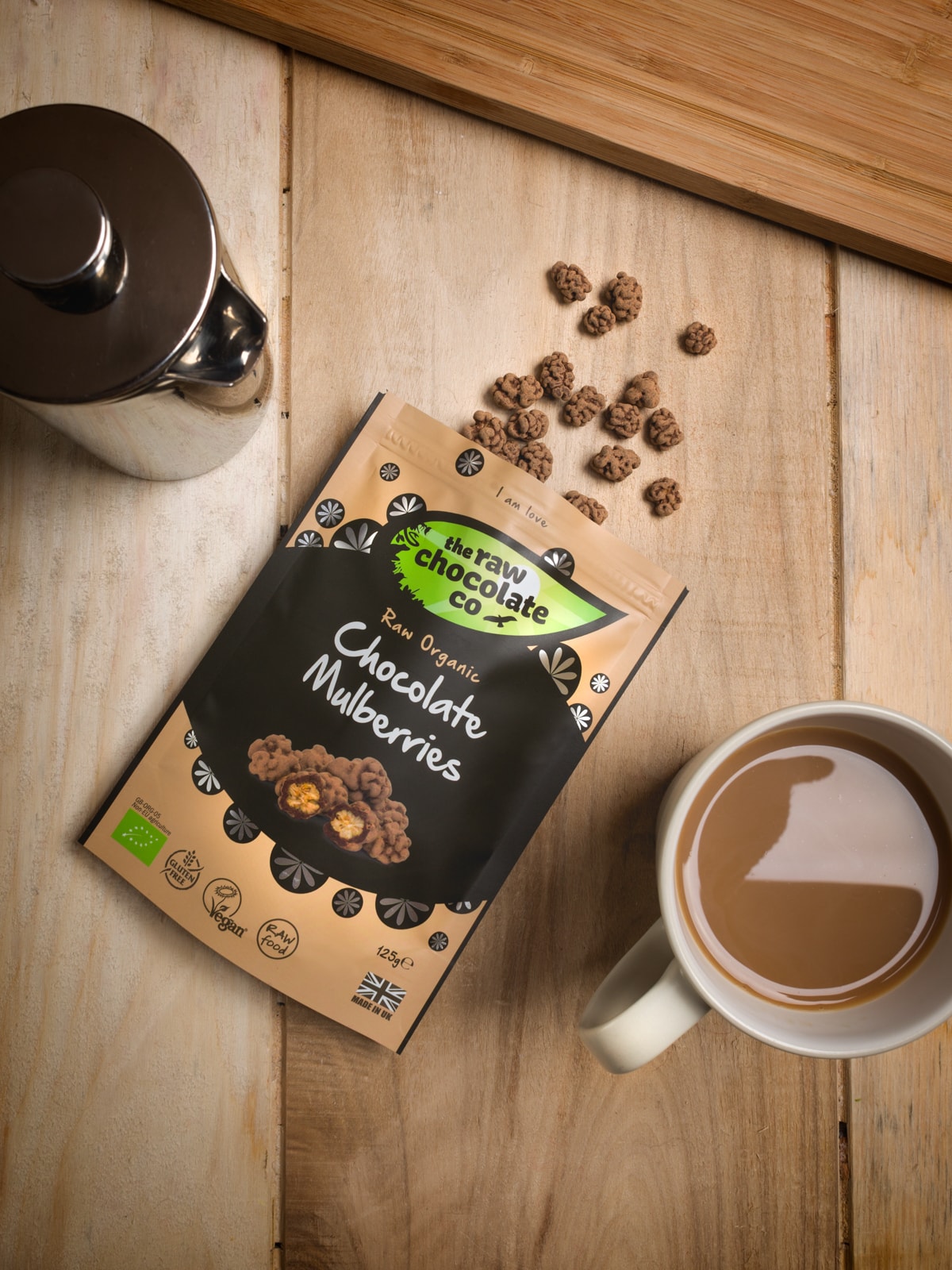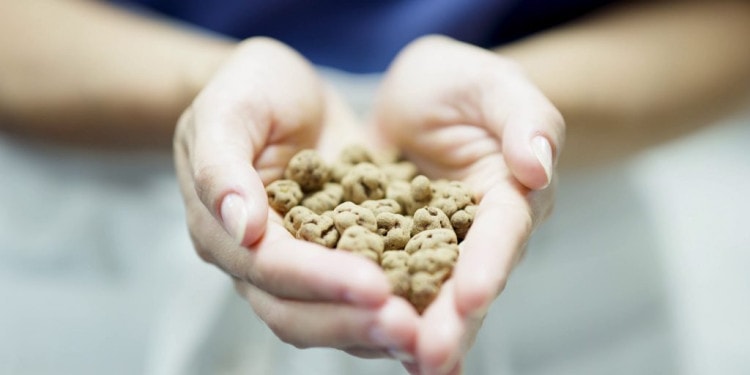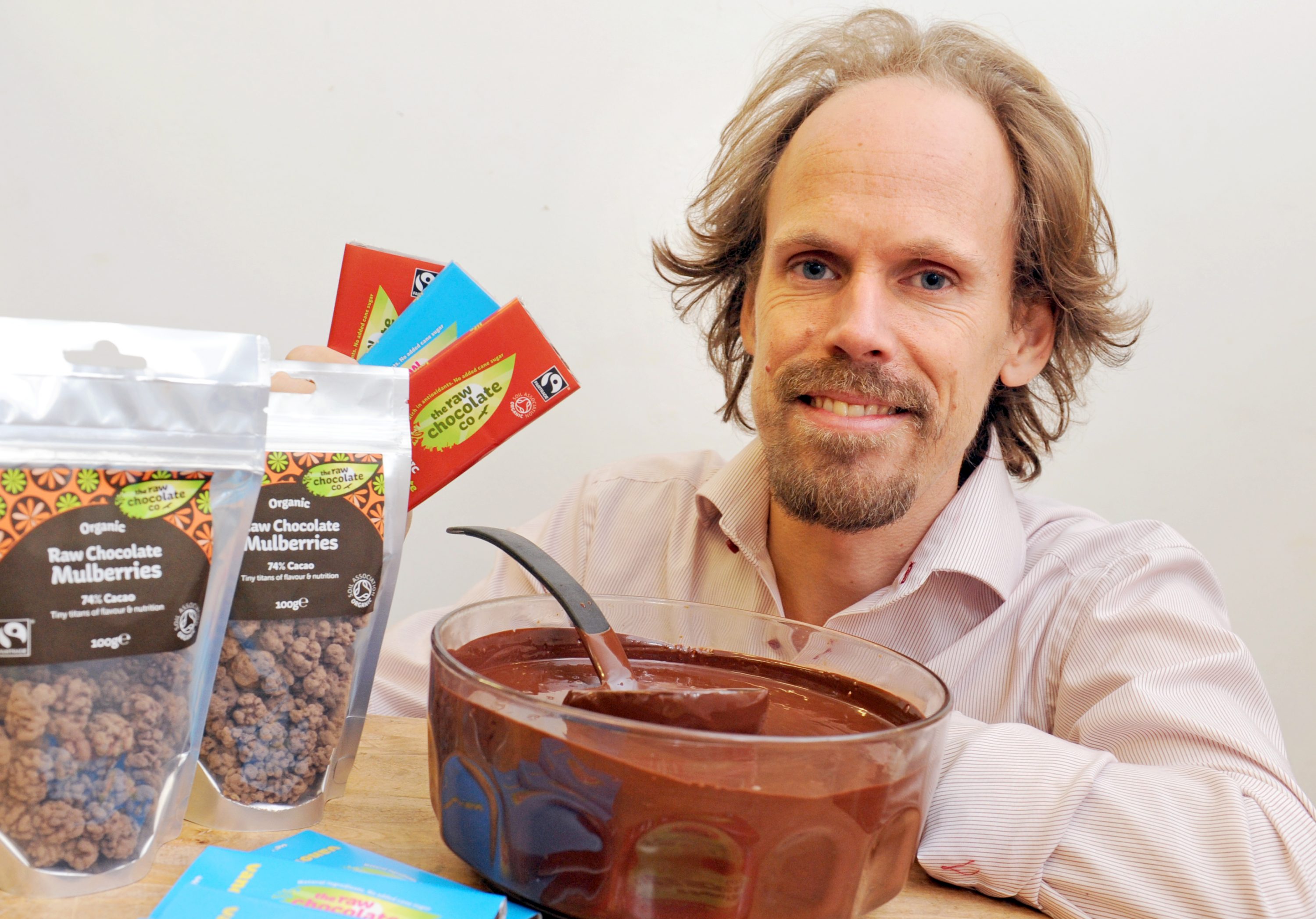Focused on high quality and consumerism rather than remunerative approaches, The Raw Chocolate Company breaks the trend of modern day businesses. From organically sourced Peruvian cacao, which is sourced in compliance with Fairtrade standards to ensure maximal profit for local farmers, to their solar powered factory and low emission transportation, The Raw Chocolate Company is driven by sustainability and ethical practices. We spoke to the founder, Linus Gorpe, to discuss the business in greater detail.
In the photo: Raw Chocolate company founder Linus Gorpe. Photo by Derek Martin
Q: Can you give us a quick background behind the Raw Chocolate Company? Where did it all begin and what was the main ambition?
LG: I wanted to eat chocolate that tasted great and made me feel good after eating it. You see, I’ve always loved chocolate. When my son was younger, I made sweet treats for him with nuts and seeds and dried fruits. They were ok, but they were better coated in chocolate! But then the chocolate wasn’t that great (highly processed and lots of sugar). I’d heard that chocolate could be amazing, full of antioxidants, vitamins, minerals and so much more…I’d heard it be called ‘the food of the gods’. A friend introduced me to raw chocolate and it was awful. I thought there must be a way of making this better, of making it taste nice without compromising the nutritional qualities.
So, I read, asked for help, trained, learnt and converted my kitchen into a mini chocolate laboratory. Then my bedroom. Then another bedroom. Pretty soon the whole of my house was alive with raw chocolate and we’d cracked it, raw chocolate that tasted and had the sensation of regular high sugar chocolate.
Q: Why raw chocolate over ‘conventional’ chocolate?
LG: Making raw chocolate has a certain amount of nutritional securities with it. You have to take extreme care in the manufacturing process, you can’t use processing aids like soy lecithin or dodgy fats like palm oil. Just take a look at the ingredients in most conventional chocolate, there’s a lot of stuff in there that really shouldn’t be anywhere near chocolate. One of our best-selling bars is Pitch Dark, it has just three ingredients: cacao beans, cacao butter and coconut sugar. That’s it and that’s how it should be.
We want to make goodies that are good in every sense: good for the environment, good for the growers and good for you. We have customers that have previously had IBS issues with mainstream chocolate, but have happy tummies when eating ours. That’s good enough for us.
In the photo: Sustainable product Credit: The Raw Chocolate Company.
Q: Why is the quality and source of your ingredients so important to you?
LG: Because it is everything! Without the quality at the very start you can’t improve any further. We spent nearly 5 years trying to find the perfect goji berries for our raw chocolate gojis. They had to be organic of course, but also tasty and juicy too. We took our time, made demands and got there in the end. If the quality isn’t good enough from the start, we just won’t bother. We get ideas all the time for new products, but most of them don’t make it to market as we can’t get a long term sustainable source of high quality ingredients.
Q: Can you explain some of the accreditations you hold, along with the relationships you have with producers?
LG: All our products are Vegan and Vegetarian and we have had all our ingredients and processes verified by the Vegan Society and the Vegetarian Society to give customers peace of mind.
Most of our ingredients are certified organic too (apart from the Xylitol in our two sugar free bars which is not available organic). Organic ingredients have almost no pesticides in them and organic farming is much better for the local and wider environment, where farming is not just about the end product but also about looking after the hedgerows, trees and local fauna.
Where possible our ingredients are also certified Fairtrade, all our cacao, cacao butter, cacao powder and vanilla is fully certified. We use other ingredients that are not certified Fairtrade. In most cases this is because they are not available, for example like lucuma. This is usually due to their not being so many producer pressures on those ingredients. Social pressures that Fairtrade certification aims to alleviate tend to concentrate around popular products like cacao, coffee and tea.
We like to make products available to as many people as possible so most of our products are also Gluten Free and Kosher as well, both under strict regulation and inspection.
We don’t deal direct with growers, most of them are too small and do not have the export expertise to deal with a small company like ours halfway around the world. So, we deal with collectives like Ndali in Uganda who grow our Vanilla, they have over 2000 farmers in their co-operative. Imagine having to deal with 2000 separate producers, just for one ingredient!
Working with growers like this is still a close relationship, we let them know exactly what we need in terms of quality and taste and they can grow it. We also give them valuable market information, that they would otherwise not be party to. For example, by de–stalking the mulberries, that saves us time (and money) and we can pay them a better price, and we get a better-quality product.
Q: How is your manufacturing process different from fellow competitors?
LG: We have to keep close tabs on the temperature during our process to keep everything as cool as possible. For this reason, we grind much more slowly and for longer than most manufacturers. For some parts of the process we have had to invent and build machines ourselves! It’s not easy being ground breaking!

In the photo: Chocolate Mulberries. Credit: The Raw Chocolate Company.
Q: As well as your products being sustainable, how are your packaging methods and energy outputs also contributing to sustainability and renewability?
LG: Well, our process minimises water usage from the start. Also, our factory is powered by the wind and the sun with electricity from Ecotricity. We also incentivise our customers to switch to Ecotricity too by offering them a free hamper when they sign up for green electricity like us. In terms of our working methods and internal organisation we have introduced home working to reduce travel emissions and we travel only when absolutely necessary, favouring skype meetings wherever possible.
Last year we introduced new packaging across the range. While it was still plastic, it was no longer combined with paper, which meant lower weight (hence less transportation emissions) and also enhanced recyclability. We have been working in the long term towards fully bio-degradable packaging. We feel we are now very close and should have this new packaging within the next 24 months. The problem up until now is that biodegradable packaging has degraded too quickly and not maintained the integrity of the products suitably.
Q: It is extremely humbling to see you supporting so many charities and organisations. Can you name a couple and how you influence them?
LG: We are approached on a daily basis for help and support from many charities up and down the country. We can’t work with all but we do what we can. Some of these charities we have a longer-term relationship with. We help TeenVGN, a social network for teenage Vegans and Vegetarians who provide important support and a safe environment for young people to share, learn and grow.
We also work with Circus Starr, we fund places in their circus for disadvantaged children and their families to have a wonderful afternoon of silly fun.
We make regular contributions to the Real Junk Food Project in Manchester. They take otherwise waste food and turn it into great meals for all, sold on a pay as you feel basis and run by an army of volunteers. We don’t really ever have any ‘waste’ chocolate, we just figure that they probably need some great chocolate every now and again.
We also like to support Love Support Unite when we can. They are on a mission to help life communities out of food, education and enterprise poverty in Malawi, recently having built an entire school and support system for orphaned children.
Q: How do you plan to develop the business over the next few years?
LG: As well as making sure all the packaging becomes biodegradable we’ve got some exciting plans for our Raw Chocolate bars including new sizes and flavours. We’ve spent an arduous few years inventing and testing and we’re now nearly ready to release some awesome taste bud tingling combinations. There is also almost an endless list of fruits, nuts, seeds and more to coat in chocolate. I can’t tell you any more just yet, but we do have some other amazing plans too.
EDITOR’S NOTE: THE OPINIONS EXPRESSED HERE BY IMPAKTER.COM COLUMNISTS ARE THEIR OWN, NOT THOSE OF IMPAKTER.COM.








